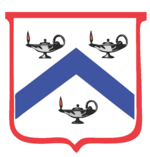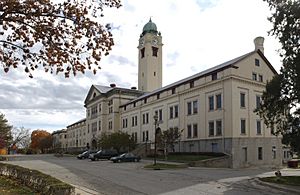United States Army Combined Arms Center facts for kids
Quick facts for kids United States Army Combined Arms Center |
|
|---|---|

USACAC Shoulder Sleeve Insignia
|
|
| Active | 1973–present |
| Country | |
| Branch | |
| Role | Provides leadership and supervision for leader development and professional military and civilian education. |
| Size | 2,000+ |
| Part of | 16 major schools and centers. |
| Garrison/HQ | Fort Leavenworth, Kansas |
| Motto(s) | "Ad Bellum Pace Parati" (Latin) "Prepared in peace for war" |
| Commanders | |
| Current commander |
LTG Milford H. Beagle Jr. |
| Insignia | |
| Flag | |
The U.S. Army Combined Arms Center (USACAC) is a very important part of the United States Army. It's located at Fort Leavenworth, Kansas. USACAC helps train and educate Army leaders and soldiers. It also develops new ideas and strategies for how the Army operates. Think of it as a "brain" for the Army, helping it get ready for different missions around the world. It works closely with the United States Army Training and Doctrine Command (TRADOC).
Contents
What USACAC Does
The Combined Arms Center, or CAC, is like the Army's main learning and thinking hub. It helps prepare soldiers and leaders for different challenges.
- Training Leaders: CAC helps develop Army leaders. This includes both military and civilian education.
- Developing Training: It creates and supports training programs. These programs help soldiers learn new skills.
- Battle Command: CAC works on how commanders lead their troops in battle. This includes using technology and good decision-making.
- Army Ideas: It develops the Army's "doctrine." This is like the Army's playbook for how it operates.
- Learning from Experience: CAC collects "lessons learned" from past missions. This helps the Army improve for the future.
All these efforts help the Army stay strong and ready. They support joint missions with other military branches and international partners.
Parts of the Combined Arms Center
USACAC has several important parts. Most of them are located at Fort Leavenworth.
Army University
The Army University was created in 2015. It brings together many Army school programs. It helps make sure all these schools work well together.
- U.S. Army Command and General Staff College: This is a famous part of Army University. It's like the Army's graduate school for officers.
- Army University Press: This group publishes books, journals, and films. These materials help Army leaders learn and grow. They also create "Staff Rides" which are like field trips. These trips help people learn about military history and leadership.
Combined Arms Center for Training
This part focuses on training the Army.
- Mission Command Training Program: This program helps train commanders. They learn how to lead and make decisions in complex situations.
- Center for Army Lessons Learned: This center collects information from Army operations. It helps the Army learn from its experiences.
Mission Command Center of Excellence
This center, started in 2010, focuses on "Mission Command." Mission Command is how the Army leads its forces. It means giving soldiers the power to make smart decisions. This helps the Army act quickly and effectively.
- What they do: This center works on everything related to Mission Command. This includes training, equipment, and leadership. Their goal is to prepare leaders for complex operations.
U.S. Army Warrant Officer Career College
This college is located at Fort Novosel. It trains warrant officers. Warrant officers are special technical experts in the Army.
Fort Leavenworth: The Army's Intellectual Home
Fort Leavenworth, Kansas, is a very old Army base. It has been operating continuously since 1827. It's known for its beautiful campus. This historic post is the home of the US Army's Combined Arms Center. Many people call CAC the "Intellectual Center of the Army." It's a key place for many Army officers.
Since 1882, CAC has been preparing the Army for war. Today, it helps the Army fight terrorism. It also helps the Army change to meet new threats in the future.
How USACAC is Organized
The Combined Arms Center has a clear structure to get its work done.
- The Commander: The commander is in charge of everyone and everything. They make sure all missions are completed well.
- Command Sergeant Major: This person is responsible for the enlisted soldiers. They help develop non-commissioned officers.
- Chief of Staff: This person helps manage the daily activities. They work on policies and procedures for the command.
- Major Organizations: These groups do most of the work for CAC. Each one focuses on a main job.
- Schools and Centers: These are spread across the country. They train soldiers in specific skills. For example, they might train Infantry soldiers. CAC helps bring all these specialized skills together.
Military Review Journal
Since 1922, the center has published a journal. It's called Military Review. It comes out every two months.
Leaders of USACAC
The leader of the Combined Arms Center is a Lieutenant General. This is a very high rank in the Army.
Past Commanders
- Lieutenant General James C. Riley (2001–2003)
- Lieutenant General William S. Wallace (2003–2005)
- Lieutenant General David H. Petraeus (2005–2007)
- Lieutenant General William B. Caldwell IV (2007–2009)
- Lieutenant General Robert L. Caslen Jr. (2010–2011)
- Lieutenant General David G. Perkins (2011–2014)
- Lieutenant General Robert B. Brown (2014–2016)
- Lieutenant General Michael Lundy (2016–2019)
- Lieutenant General James E. Rainey (2019–2021)
- Lieutenant General Theodore D. Martin (2021–2022)
- Lieutenant General Milford H. Beagle Jr. (2022–Present)
Command Sergeants Major
- Command Sergeant Major L. H. Smith (1991–1993)
- Command Sergeant Major Edward D. Naylor (1993–1997)
- Command Sergeant Major Cynthia A. Pritchett (1997–2003)
- Command Sergeant Major John D. Sparks (2003–2005)
- Command Sergeant Major Cory N. McCarty (2005–2007)
- Command Sergeant Major David M. Bruner (2007–2008)
- Command Sergeant Major Philip F. Johndrow (2008–2011)
- Command Sergeant Major Christopher K. Greca (2011–2013)
- Command Sergeant Major Jeffrey W. Wright (2013–2014)
- Command Sergeant Major David Turnbull (2014–2018)
- Command Sergeant Major Eric C. Dostie (2018–2021)
- Command Sergeant Major Stephen H. Helton (2021–Present)
See also
- U.S. Army Training and Doctrine Command
- Buffalo Soldier
 | Bessie Coleman |
 | Spann Watson |
 | Jill E. Brown |
 | Sherman W. White |



